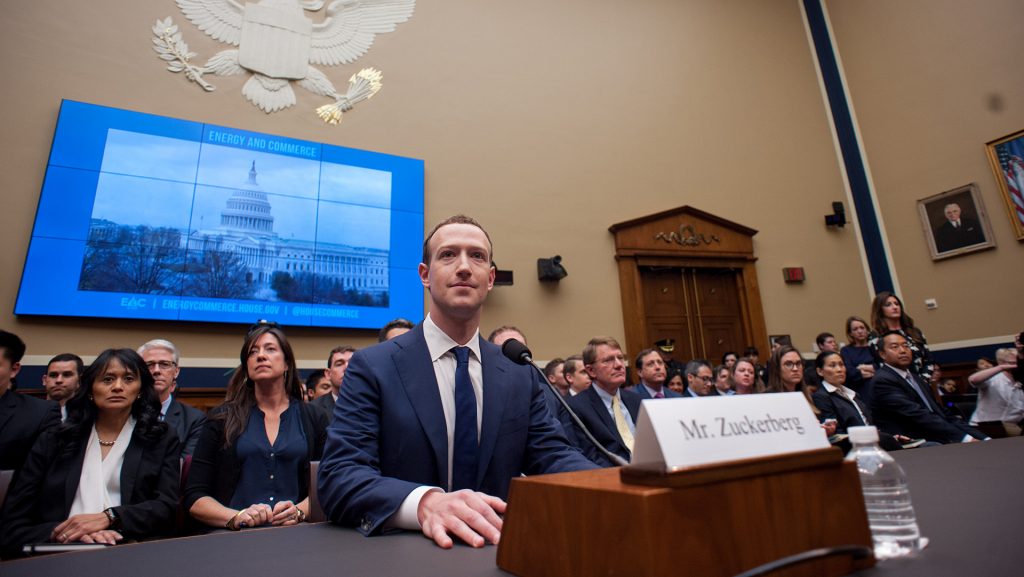Opinion: Facebook needs to be a bastion of free expression
Mark Zuckerberg is moving in the right direction with his company’s decisions regarding First Amendment freedom.
Facebook CEO Mark Zuckerberg appears before the House Energy and Commerce Committee in Washington, D.C., on April 11, 2018.
October 28, 2019
Facebook is probably the most ubiquitous space for sharing information in modern society. Fortunately, Zuckerberg’s recent speech at Georgetown University seems to indicate that he generally understands the importance of providing everyone a fair shake at making their views heard.
“More people across the spectrum believe that achieving the political outcomes they think matter is more important than every person having a voice,” Zuckerberg said. “I think that’s dangerous.”
He’s exactly right. It is always better to have too much free expression than not enough. Social-media platforms should be just that — platforms. Cell-phone companies do not regulate texts or group-texts for fake news, conspiracies, or so-called hate speech. This should be the same with Facebook. The authority and power that Facebook currently bestows upon its fact checkers is morally illegitimate.
Even the most prominent news sources in America are not immune to error. Newspapers from The Daily Iowan to the Wall Street Journal issue corrections and retractions to their own mistakes when necessary. No group of fact checkers possesses the collective omniscience to objectively determine the accuracy of claims in every single Facebook advertisement.
There is a spontaneous order on social media. People fact check each other. It’s almost impossible to fairly distinguish between satire, hate speech, and authentic news.
About a week before the 2018 midterm election I posted a Facebook status encouraging Republicans to vote on Tuesday and Democrats to vote on Wednesday. It was a joke and my friends knew that. But someone reported the post, then Facebook deleted it and sent a notification scolding me for spreading disinformation.
It is always better to have too much free expression than not enough.
Rep. Alexandria Ocasio-Cortez, D-N.Y., grilled Zuckerberg during a hearing last week. During the hearing, the indignant congresswoman smeared The Daily Caller, a right-leaning news site co-founded by Tucker Carlson, calling the site “white supremacist.” The angry 29-year old is not qualified to dictate how an extremely complex multinational tech corporation should conduct its business.
Sen. Elizabeth Warren, D-Mass., is on a populist crusade to break up Facebook and prevent it from owning subsidiaries such as Instagram or Whatsapp. Such despotic regulation runs anathema to American values. Earlier this month, leaked audio revealed that Zuckerberg justifiably labeled her as an existential threat to his company.
Senators such as Josh Hawley, R-Mo., and Ted Cruz, R-Tex., seem eager to regulate supposed viewpoint discrimination against conservatives by social-media companies, which is equally wrong. They seem short-sighted to the potential of their new regulatory structures being abused when Democrats are in power. Facebook is a private corporation and should be legally free to regulate content as it sees fit.
That said, I believe the platform was wrong to ban Alex Jones, Milo Yiannopoulos, and Louis Farakhan among other provocative individuals from the site last spring. It creates the potential for a slippery slope. Their speech may be abhorrent, but as a general matter it was not directly harming anyone.
That’s not to say Facebook should be a jungle where anything goes. If someone explicitly incites violence, then platforms would be justified to censor or ban that person. The problem with the bans against Jones and others like him is that Facebook failed to provide clear standards as to what policies were violated and how other users could avoid similar penalties. Lifetime bans are unforgiving and wrong because people are capable of change.
Protecting free speech is paramount for a free society. If Facebook is truly committed to fostering freedom of expression, then its policies should reflect the sentiments of Zuckerberg’s Georgetown speech.
Columns reflect the opinions of the authors and are not necessarily those of the Editorial Board, The Daily Iowan, or other organizations in which the author may be involved.


















